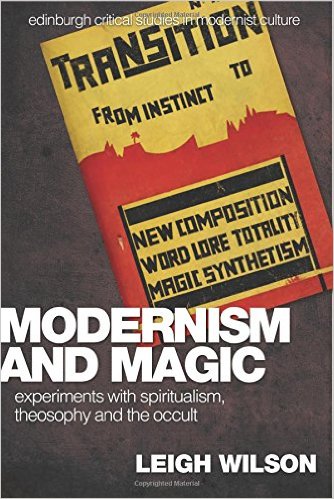Leigh Wilson, Modernism and Magic (Edinburgh University Press, 2012)
 This study presents a new account of the relation between modernism and occult discourses. While modernism’s engagement with the occult has been approached by critics as the result of a loss of faith in representation, an attempt to draw on science as the primary discourse of modernity, or as an attempt to draw on a hidden history of ideas, Leigh Wilson argues that these discourses have at their heart a magical practice which remakes the relationship between world and representation. As Wilson demonstrates, the courses of the occult are based on a magical mimesis which transforms the nature of the copy, from inert to vital, from dead to alive, from static to animated, from powerless to powerful. Wilson explores the aesthetic and political implications of this relationship in the work of those writers, artists and filmmakers who were most self-consciously experimental, including James Joyce, Ezra Pound, Dziga Vertov and Sergei M. Eisenstein.
This study presents a new account of the relation between modernism and occult discourses. While modernism’s engagement with the occult has been approached by critics as the result of a loss of faith in representation, an attempt to draw on science as the primary discourse of modernity, or as an attempt to draw on a hidden history of ideas, Leigh Wilson argues that these discourses have at their heart a magical practice which remakes the relationship between world and representation. As Wilson demonstrates, the courses of the occult are based on a magical mimesis which transforms the nature of the copy, from inert to vital, from dead to alive, from static to animated, from powerless to powerful. Wilson explores the aesthetic and political implications of this relationship in the work of those writers, artists and filmmakers who were most self-consciously experimental, including James Joyce, Ezra Pound, Dziga Vertov and Sergei M. Eisenstein.
In this provocative and engaging book, Leigh Wilson finds magic at the heart of modernism. Looking afresh at its fascination with the occult, she suggests that modernist writers and filmmakers drew on magical thinking in their experimental art to create works that radically transformed the world they knew.
– Helen Carr, Goldsmiths, University of London
This is a major contribution not only to our understanding of modernism’s fascination with the supernatural, but of modernism’s fundamental investment in modern magic. It breaks new ground by considering magic’s importance for filmmakers and artists, novelists and poets. It is the most important book on the topic in over a decade.
– Stephen Ross, University of Victoria
[A] valuable contribution towards a deeper understanding of the interrelatedness of occult discourses and those of modernist art.
– Tessel M. Bauduin, Cultural History
I learned a great deal in reading Modernism and Magic and recommend it unreservedly to anyone interested in modernism and the occult.
– Lee Garver, ELT 54.7
The greatest achievement of this book lies in its opening up an area of intellectual activity that hitherto has been underestimated, under-respected, and even viewed as dubious, despite the fact that it is of crucial importance for the development of the arts and thought of the twentieth century (continuing to this day).
– Thomas Steinfeld, Modernism/modernity 21.1
Wilson’s text provides an excellent rereading of modernism in the context of magic. It offers the reader wonderful background on a number of modernist authors and filmmakers.
– Erin Hollis, James Joyce Quarterly 50.4


The Institute for Modern and Contemporary Culture
University of Westminster Department of English, Linguistics and Cultural Studies
32-38 Wells Street, London W1T 3UW. United Kingdom.
